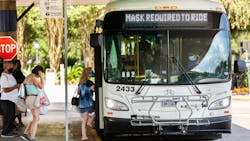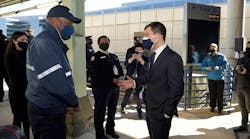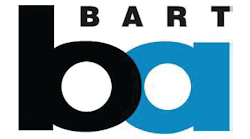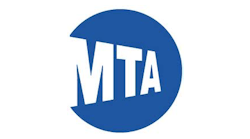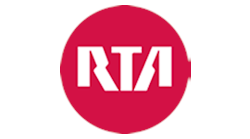TSA will fine travelers between $250 and $1,500 for not wearing masks
The Transportation Security Administration (TSA) updated its guidance late last week following implementation of President Joe Biden’s Executive Order requiring face masks to be work by on transportation modes including public transit. TSA says it will recommend a fine range of $250 for first time offenders and up to $1,500 for repeat offenders.
TSA also notes it would seek an amount outside of the $250-$1,500 range “based on substantial aggravating or mitigating factors.”
TSA has provided specific guidance to system operators on how to report violations of the rule so TSA would issue the fines to those who refuse to comply with mask usage.
In the original security directive, TSA directed owner/operators to establish procedures to manage non-compliance. The guidance includes the denial of boarding; making best efforts to disembark the individual as soon as practical or making best efforts to remove the individual from the transportation hub/facility.
Should an individual’s refusal constitute a “significant security concern,” owner/operators are directed to report the incident to the Transportation Security Operations Center.
The information on fines that will be levied against non-compliant offenders comes a day after the U.S. House Committee on Transportation & Infrastructure held a hearing, “Protecting Transportation Workers and Passengers from COVID: Gaps in Safety, Lessons Learned and Next Steps,” where Lynx Bus Operator and Amalgamated Transit Union Local 1596 Member Ismael Rivera testified about the perils of operators as “mask police.”
“When someone boards one of our buses without a mask, we are faced with a tough choice: say nothing and risk that an infected rider will spread the virus or tell the passenger to put on a mask and risk a violent reaction,” Rivera included in written testimony. “When you confront someone, it can escalate quickly. He could spit on you, he could throw something at you or he could hurt another passenger. But what if that person is sick and contaminates everyone on this bus? And you could have prevented that?”
In practice, enforcing mask usage has been tricky for transit systems, which have been requiring passengers and employees to wear masks for months prior to the signing of the Executive Order in January.
Metropolitan Transportation Authority in New York was among the first transit systems in the U.S. to say a fine of $50 would be levied against violators, but the authority also noted frontline employees would not be responsible for enforcement, which would fall within the responsibilities of the MTA Police Department, New York Police Department and Bridge and Tunnel Officers. It should also be noted MTA has worked to install mask dispensers in buses and at rail stations, as well as established a region wide Mask Force to promote and encourage proper mask wearing.
Greater Cleveland Regional Transit Authority (RTA) has instructed its operators to ask non-compliant passengers to wear masks and if those passengers refuse, transit police will be contacted and “they will address the passenger at the nearest stop.”
“The goal of our transit police department is to gain compliance through cooperation and we believe that we can accomplish this by enforcement through communication,” explained Greater Cleveland RTA.
Greater Cleveland RTA says many operators and transit police officers have an extra supply of masks to give to passengers who need one, as do its service quality supervisors and customer service center employees at the busiest transit centers: Tower City and Windermere Rapid Station.
On Bay Area Rapid Transit’s (BART) system, free masks are available at all stations, as well as from transit police and system ambassadors.
As far as enforcement goes, BART Police Officers are responsible for offering riders reminders of the requirement to wear masks and officers will be positioned at the entrances of stations and near faregates.
BART Police will give verbal reminders of the requirement to riders without face coverings when police encounter someone not covering their mouth and nose. BART explains a person will be asked to leave the system only upon refusal to cover their face.

Mischa Wanek-Libman | Group Editorial Director
Mischa Wanek-Libman is director of communications with Transdev North America. She has more than 20 years of experience working in the transportation industry covering construction projects, engineering challenges, transit and rail operations and best practices.
Wanek-Libman has held top editorial positions at freight rail and public transportation business-to-business publications including as editor-in-chief and editorial director of Mass Transit from 2018-2024. She has been recognized for editorial excellence through her individual work, as well as for collaborative content.
She is an active member of the American Public Transportation Association's Marketing and Communications Committee and served 14 years as a Board Observer on the National Railroad Construction and Maintenance Association (NRC) Board of Directors.
She is a graduate of Drake University in Des Moines, Iowa, where she earned a Bachelor of Arts degree in Journalism and Mass Communication.
